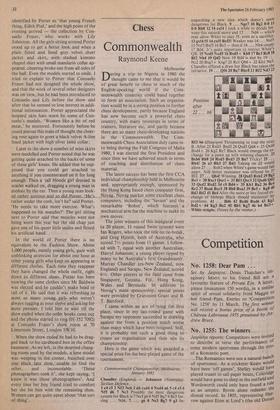Chess
Commonwealth
Raymond Keene
Melbourne
During a trip to Nigeria in 1980 the thought came to me that it would be of great benefit to chess in much of the English-speaking world if the Com- monwealth countries could band together to form an association. Such an organisa- tion would be in a strong position to further chess development, partly because England has now become such a powerful chess country, with many resources in terms of trainers, literature etc, and partly because there are so many chess-developing nations in the Commonwealth. The Com- monwealth Chess Association duly came in- to being during the Fide Congress of Malta 1980, I was elected the first President and since then we have achieved much in terms of coaching and distribution of chess material.
The latest success has been the first CCA individual championship held in Melbourne and, appropriately enough, sponsored by the Hong Kong based chess computer firm, Novag. Novag market some excellent chess computers, including the 'Savant' and the remarkable 'Robot', which features a mechanical arm for the machine to make its own moves.
The joint winners of this inaugural event (a 20 player, II round Swiss system) were Ian Rogers, who took the title on tie-break, and Greg Hjorth, both of Australia, who scored 71/2 points from 11 games. I follow- ed with 7, equal with another Australian, Darryl Johansen, a young player tipped by many to be Australia's first Grandmaster. Murray Chandler (ex-New Zealand, now England) and Sarapu, New Zealand, scored 6 1/2. Other players in the field came from Singapore, Guyana, Fiji, Hong Kong, Wales and Bermuda. In addition to Novag's main sponsorship, special prizes were provided by Grieveson Grant and B. T. Batsford.
I came within an ace of tying for first place, since in my last-round game with Sarapu my opponent succeeded in drawing against me from a position much worse than many which have been resigned. Still, it is probably not such a good thing to create an organisation and then win its championship.
Here is the game which was awarded a special prize for the best played game of the tournament.
Commonwealth Championship, Melbourne, January 1983
Chandler (England) — Johansen (Australia): Sicilian Defence.
1 e4 c5 2 Nf3 Nc6 3 d4 cxd4 4 Nxd4 a6 5 c4 e5 6 Nf5 d6 7 Nc3 Possibly the most dangerous system for Black is 7 Ne3 g6 8 Nd5 Bg7 9 Be3 for- cing ... Nd4. 7 ... g6 8 Ne3 Bg7 9 g3 In- augurating a new idea which doesn't seem
dangerous for Black. 9 Nge7 10 Bg2 0-0 11 0-0 Rb8 12 f4 exf4 I took a while to decide bet- ween this natural move and 12 . . Nd4 — which may allow White to play f5, even as a sacrifice. 13 gxf4 f5 14 exf5 Bxf5! Weaker was 14 ... Nxf5 15 Nxf5 Bxf5 16 Be3 — then if 16 ... Nb4 simplY 17 Bd4. It's quite important to restrict White's QB. 15 NedS NxdS 16 Bxd5 + Kh8 17 Be3 Re8 18 Bf2 Nb4 19 Qd2 Now 19 Bd4 is met by 19 .1, Nc2 20 Bxg7 + Kxg7 21 Rcl Qb6 + 22 Khl Ne3. Chandler offered a draw but Black has taken the initiative. 19 ... Qf6 20 Ba7 Rbc8 21 Rf2 Nd3 22
Position after 22... b6
1213 b6 (Diagram) Threatening to trap the stray B. After 23 Rxd3 Bxd3 24 Qxd3 Qd4 + 25 Qxd4 Bxd4 + 26 Kg2 Re7 Black would emerge the ex- change for a pawn up with winning chances. 23 Bxb6 Rb8 24 Rxd3 Bxd3 25 Ba7 Tricky! 25 • • • Rb4! 26 a3 Rb3 27 Rdl Taking on d3 would allow 27 ... Rxb2 when White's game would fall apart. Still better resistance was offered by 27 Bf2. 27 ... Qh4! Winning. 28 Qxd3 Rxb2 29 Bg2 Rel + 30 Rxel Qxel + 31 Bf 1 Qxc3 32 Qxd6 Qd2 33 Qxd2 Rxd2 34 c5 Bd4 + 35 Khl1 Ra2 36 Bc4 Rc2 37 Bxa6 BxcS 38 Bb8 Bxa3 39 Be5 + Kg8 40 Bd3 Rd2 41 Be4 After the more or less forced ex- change of bishops Black should encounter no problems. 41 ... Bd6 42 Bxd6 Rxd6 43 Kg2 Rd2 + 44 Kg3 Reg 45 Bbl Kg7 46 h4 Re3 White resigns. (Notes by the winner.)










































 Previous page
Previous page